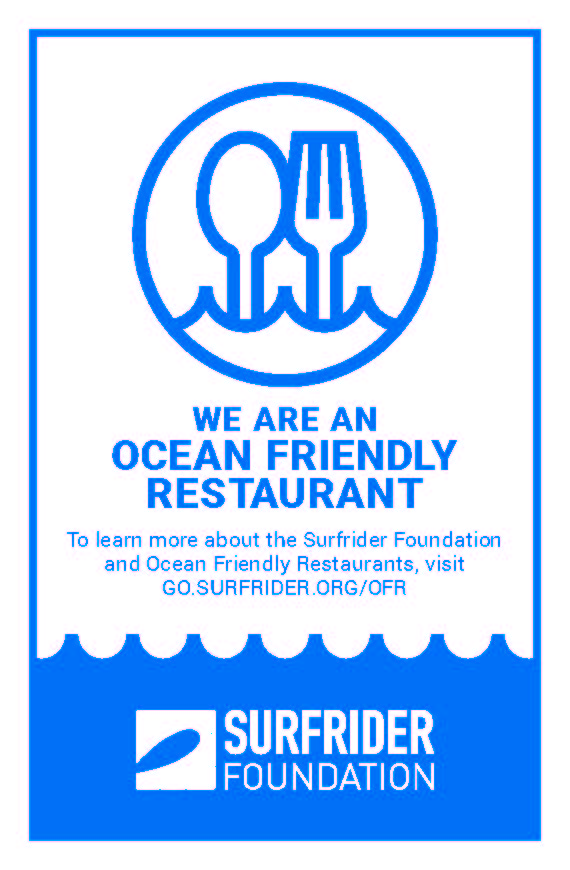
Ocean Friendly Restaurants
Stop Pollution At The Source
Plastic pollution is wreaking havoc on our oceans, with a staggering 11 million metric tons of plastic waste entering each year, and an astonishing 11 billion metric tons expected by 2025. The primary culprits? Those pesky single-use plastics like bags, bottles, and wrappers. But don’t worry! The Surfrider Foundation's Ocean Friendly Restaurants program is stepping up, supporting eateries that have ditched these plastics and creating a network that paves the way to a plastic-free future.
South Sound Ocean Friendly Restaurants exemplify how community and eco-conscious business practices can significantly reduce oceanic plastic waste. Show your support by dining at these fantastic establishments.
About the Program
Launched in 2013 by the Surfrider Foundation's Huntington Beach chapter, Ocean Friendly Restaurants have seen significant growth, expanding their eco-conscious principles across Southern California, Hawaii, and nationwide by 2018. Our goal is to bring together environmentally-conscious restaurants, activists, and customers to promote sustainability for our well-being and the future of our planet, bringing balance and joy to our lives. Are you ready to join us? Interested in converting your restaurant into an Ocean Friendly establishment?

The South Sound Surfrider Ocean Friendly Restaurants program celebrates restaurants that are dedicated to making eco-conscious choices for our ocean, ensuring diners can enjoy their meals with a side of peace of mind.
Find an Ocean Friendly Restaurant Near You
{{ errorMessage }}
menu Menu
Quickly browse the list for Ocean Friendly Restaurants in your neighborhood:
{{ city }}
- {{ ofr.ocean_friendly_business_name }} {{ ofr.ocean_friendly_business_name }}
How To Participate
Mandatory Criteria (All 7 Required):
- Only reusable foodware is used for onsite dining.*
- Paper straws are provided only upon request.**
- No expanded polystyrene use (aka Styrofoam).
- No plastic bags are used for takeout or to-go orders.
- Single-use utensils, straws, condiments, and other accessory items are provided only upon request.
- Beverages are not sold in plastic bottles.
- Proper recycling practices are followed.
* Foodware includes dinnerware, drinkware, silverware, and ramekins/containers.
** Exceptions may be made for naturally occurring materials (e.g. hay, bamboo) and reusables (e.g. metal, glass), not including bio-based plastic. Straws should be provided to anyone who needs one, including people with disabilities. Read more here.
Check out our Quick Guide for more tips to meet each of the criteria.
Review our Ocean Friendly Foodware Guide to learn about greenwashing, product alternatives, and creative ways to implement more reusables.
Optional Criteria (Choose At Least 3):
- A discount is offered for customers with a reusable item (e.g. cup, container, bag).
- Vegetarian and vegan food options are offered on a regular basis.
- All seafood is ‘Best Choice’ or ‘Good Alternative’ as defined by Seafood Watch, or no seafood is served.*
- Water conservation and pollution mitigation efforts are implemented.**
- Energy efficiency efforts are in place.***
- Concessions and pre-packaged food items are not sold in plastic packaging.
- Composting efforts are in place for food waste.
- Neither single-use plastic nor bio-based plastic containers are used for takeout or to-go orders, reusable containers are preferred.
* Locally sourced, sustainable seafood is preferred and should be prioritized when Seafood Watch recommendations do not apply.
** Examples include installing low-flow faucets and toilets, offering drinking water upon request only, no hosing down outside to reduce urban runoff, proper disposal of FOG, and up-to-date septic or sewage to prevent wastewater pollution.
*** Examples include switching to LED lighting, installing solar panels, using Energy Star certified appliances and/or other efforts to use less energy.
Restaurant Benefits
- Ocean Friendly Restaurants marketing collateral including window stickers, brochures, and bill inserts to promote your membership to customers.
- Use of Ocean Friendly Restaurants logos for restaurant menu, website and other restaurant marketing materials.
- Restaurant listed on Surfrider national and chapter websites.
- Restaurant included in Ocean Friendly Restaurants national map on Surfrider national and chapter websites.
- Launch parties and collaborative promotions with your nearest Surfrider chapter.
- Access to national vendor discounts on sustainable restaurant and to-go products.
- Tax-deductible donation opportunity.
- Association with a nationally recognized nonprofit with thousands of members and supporters working hard to keep our ocean healthy and protected!

The Surfrider Foundation acknowledges that we cannot claim that all listed Ocean Friendly Restaurants are 100% in compliance with our standards at all times, but that the Surfrider Foundation strives to diligently review compliance on a regular basis. If an Ocean Friendly Restaurant is found to be out of compliance, they are removed from the website as quickly as possible. Such a restaurant will not be reinstated on the list of Ocean Friendly Restaurants until the compliance issue is remedied.
